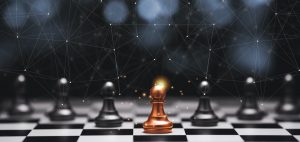Covid-19 has accelerated our ‘liquid’ lives – that is, our ability to be adaptable, flexible and fluid have become ever more important – and educational institutions must adapt, say Nick van Dam and Noémie Le Pertel
In an ever-competitive market, universities and Business Schools that build the ability to stay ahead of the game, rather than merely responding after an event, will ultimately be the most successful.
Covid-19 has brought about the kind of change in months that you normally only see after generations. Like most industries, education has had to rapidly acclimatise.
The fact is, universities have always adapted, learned and moved on – that is the basis of academic enquiry and the heart of the sector’s strength. Across higher education, universities are already offering new, and completely online courses, attracting new students from different markets and innovating in how they work.
But in the Covid age, we’re also seeing the disappearance of existing structures, patterns, codes, rules and institutions that once provided stable foundations in society and guided people’s behaviours.
Liquid modernity
The late sociologist, Zygmunt Bauman, described this phenomenon as ‘liquid modernity’. The theory states that liquids are characterised by ultimate agility – they flow and conform to various structures while retaining their volume. Therefore, liquid represents adaptability, flexibility and fluidity. The world we are living in has become liquid across many dimensions, including economic, social, geopolitical, environmental, technological and educational.
The reality is that the ‘new normal’ may differ in quite a few respects – but what unites it all is its fragility, temporariness, vulnerability and inclination to constant change. To ‘be modern’ means to modernise – compulsively and obsessively; not so much just ‘to be’. Each new structure which replaces the previous one as soon as it is declared ‘old-fashioned’ and past its use-by date is only another momentary settlement – acknowledged as temporary and ‘until further notice’. As time flows on, ‘modernity’ changes its forms.
The new agile?
Despite these fluid times, institutions of higher education continue to operate in a state that Bauman calls ‘solid modernity’. But with the absence of stable employment structures, the chaos from Covid-19 and ever-evolving technology, there is no doubt that we are in a liquid state.
But this passage from solid to liquid modernity has created new and unprecedented settings and challenges for individual life pursuits. Essentially Covid-19 has accelerated our liquid lives, which means our ability to be adaptable, flexible and fluid have become ever more important. This renders many of our plans and forecasts irrelevant.
But even before Covid-19, work and careers were becoming fluid. The workplace is a very different place to what it used to be 30 years ago or more. From the introduction of new technology and tools, to the rising trend of remote working, the modern office has adapted in a number of ways. Employees now tend to stay with a company for only a few years before making a change. Gone are the days where people would regularly stay with a company for 30+ years. People are also more likely to change their careers, and not just their jobs, over their lifetime, partly because they will be living and working for much longer than their parents did. Because of this, people will need to develop distinctive competencies as they switch between roles as students, employees, contractors and entrepreneurs. In many ways’ ‘liquid’ has become the new agile.
Educational institutions can and must adapt
It has become almost universally accepted that universities must adapt to the world they live in. But the way that university education has been organised and delivered has not changed dramatically over the last 50 years. Students still turn up on campus, take exams and begin their careers after graduation. They do not operate in a liquid state – the reality is the world has changed so much, but the way students are educated has not.
The current educational model is not sustainable in a modern world. But the pandemic has proved that educational institutions can adapt when they face a compelling need quickly and comprehensively.
At their best, Business Schools are innovators, risk-takers and pioneers, and it is these characteristics that should be brought to the fore. Often, my experience is that university leaders are keen for their institutions to develop, and academic and professional staff share an ambition to deliver the very best teaching and research. However other factors are at play, institutional inertia, governance by consent and the ability of individual stakeholders can hinder innovation. However, as work and careers become more fluid, innovation and progress are more important than ever. The virus has underscored the fact that Business Schools need to develop a liquid learning model – and they need to do it now.
The five characteristics of liquid learning
‘Liquid learning’ is a comprehensive, holistic, complete and interactive educational experience. It blends physical and digital learning ecosystems in innovative ways so that students obtain the highest quality of education no matter where in the world they are and what their current situations might be, as long as they have access to the technology they need. Liquid learning embodies richness of experience through experiential learning and is based on five guiding principles:
1. It’s active and social: in a liquid learning environment, students have active and social experiences that stimulate both their cognitive and emotional development. When they’re in active learning mode, students collaborate, observe others, give and receive feedback, and reflect on their experiences. As they engage in social learning, they also foster human connections.
Active and social learning is enhanced through multicultural group assignments and discussions, individual study projects, multimedia cases, simulations, learning games, labs, role-playing exercises, presentations, networking events, discussion forums, debates, peer evaluation and feedback, and gamification techniques that engage the learners. Through active and social learning, students gain a deep understanding of concepts and boost both short- and long-term recall. They acquire knowledge, develop skills, and change mindsets.
2. It’s multichannel: multichannel learning enables interactive learning at any time and in any place, whether students are taking classes in person, online, or in a hybrid model. Schools that offer multichannel learning can easily switch between formats, so they can still provide a dynamic learning experience for their students even in sudden emergencies. In this way, multichannel learning is ‘liquid-proof’.
3. It’s personalised to the student: today’s students can customise every aspect of their lives, from how they order coffee to how they read the news. It’s no surprise they expect to be able to personalise the way they consume education in order to meet their unique needs and aspirations. Personalisation allows students to opt for learning in any place, at any time, through any pathway, at any pace of study, with any cohort, following any professor, using any technology and any type of pedagogy.
For instance, a student in Europe might enrol in an elective class in Asia that he can take online on a part-time basis. He meets with other international students in virtual classrooms where they’re taught by an adjunct professor and a CEO. He learns by doing when he undertakes to solve a real-world problem at his current job.
Some Business Schools offered a few of these options in the past, but the pandemic has highlighted the need for more Schools to make such options widely available. Customisation allows students to continue learning even if travel bans keep them from returning to campus or if other unforeseen circumstances arise.
Not only is personalised education critical for a liquid world, it’s also more engaging for students, which means it enhances motivation and drives academic achievement. While Schools might find it daunting to offer extensive personalisation, it can be supported by big data and AI.
4. It features faculty excellence: whether Schools are offering online or in-person education, the students’ learning experience will depend on the quality of the faculty. Excellent faculty have the capacity to inspire students to approach their studies with intellectual curiosity, which will lead them to pursue liquid learning for the rest of their careers.
To promote faculty excellence, Schools must require ongoing faculty training and solicit feedback from students and faculty peers. They must align their rewards and recognition with desired faculty behaviours. Schools must also develop a liquid faculty model that leverages a diverse blend of different faculty profiles, including researchers, adjuncts, visiting faculty, practitioners, facilitators, coaches, mentors, teaching assistants, and guest speakers.
5. It’s anchored in the real world: because the real world is liquid, students need to unlearn old habits and develop new behaviours. Once they’ve acquired new expertise and skills, students will be able to drive change and innovation. Because Covid-19 has accelerated the digitisation of real-world work, students who participate in classes that include online components develop invaluable digital skills that will help them on the job.
The future of education
If universities and Business Schools are to prosper, they must be relevant to the societies in which they exist. Universities shouldn’t operate merely as trainers of school leavers about to enter the job market; they should assert their importance as critical builders of knowledge and human capital. They must be relevant and be willing to engage with society to show how that is the case. True relevance could mean substantial change for some – more flexible models, mixed-mode pedagogy, or learning while earning, for example.
The reality is, thanks to Covid-19, the future is here. And the future of learning is fluid, dynamic, adaptable, immersive, personalised, and engaging. It is all about the richness of the experience: curricular and extracurricular, social and individual, global and local, active and reflective, cognitive and emotional, professional and personal, physical and digital, supported by research and teaching excellence.
While this mode of learning has long been in our future, the pandemic has made the transition more urgent. It has shown us that universities must embrace ‘liquid modernity’ so they can not only meet any crisis that arises but also prepare students for an ever-changing world.
Nick van Dam is a Professor at Nyenrode Business University, IE University and the University of Pennsylvania. He is also Chief Learning Officer at IE University.
Noémie Le Pertel is an Academic Director and Professor at IE University.




























